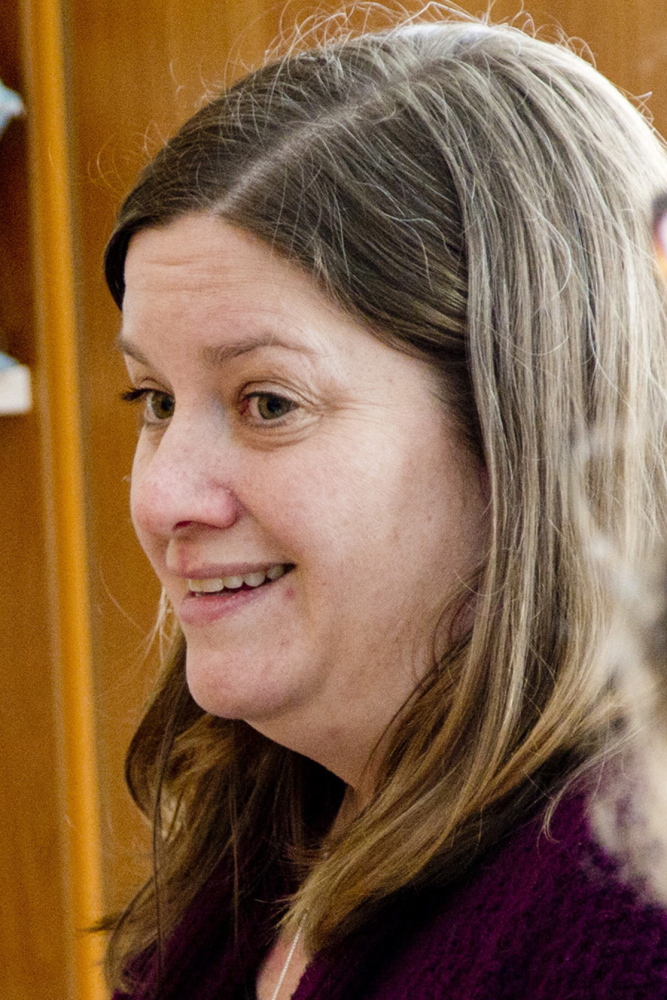Jessica Duffy, director of Gosnell Memorial Hospice House in Scarborough, started her nursing career in 2002 at Massachusetts General Hospital in Boston, where she cared for cancer patients. A year later, she wrote an essay about her first experience with a dying patient. She recently read it to University of New England medical students participating in the pilot Hospice Immersion Project. Following are summaries and excerpts from the essay:
After several weeks of orientation as a registered nurse, Duffy admitted her first patient. Mr. K was a 37-year-old father of four who had pancreatic cancer that hadn’t responded to chemotherapy. Over the course of his illness, Mr. K was readmitted several times for mounting medical complications. In that time, Duffy got to know the man and his family.
His family was always at his bedside, especially his wife, mother, sister and brothers. This was perhaps the hardest time for me, both personally and as a nurse. In my personal life, I have never experienced a patient who was dying. I remember hearing my peers talk about other patients, and they would refer to someone as “actively dying.” My new-grad peers and I would have many conversations about it, but we just couldn’t get it. How do you know this? Better yet, how can you say it and be sure?
* * *
As Mr. K’s illness worsened, his family struggled to accept his terminal condition, especially his mother.
She used to call me early in the morning, when I was working the night shift, to ask me how his night was. I would gently tell her that he was comfortable and that his condition was usually generally unchanged. She would always remark, “That’s good, right? If he’s not getting worse, he could still get better.”
* * *
In the final hours of his life, Mr. K’s pain was increasing and his blood pressure kept dropping. Repeated fluid injections were having no effect, so Duffy and other medical staff determined that it was time to stop.
I remember that last night shift I was on as if it happened only yesterday. … Here I was, a new nurse who had absolutely no experience with death, walking in to discuss a heavily weighted issue with a family who trusted me but also wanted to sustain Mr. K’s life with whatever means they could. The words stumbled out. They were followed with his wife leaving the room in tears after saying, “You need to (raise his blood pressure) now, because I can’t make this decision right now.” I agreed with her and allowed them time to collect themselves. At about 4 or 5 in the morning, a consensus had been reached that we would not (continue trying to raise his blood pressure).
* * *
I was devastated throughout the night, crying in the back and then composing myself before heading into the room. … His family took turns going into the room separately to say their own goodbyes to Mr. K. They asked if I would like some time with him. I did. It was incredibly hard to say goodbye to a man I had been trying to heal. It was difficult to put into words the immense gratitude I felt – he had allowed me the opportunity to share in his life and his family. I had a few days off after that, so we said our goodbyes. We were all crying. It was just heart-wrenching. That day was hard and I was devastated.
* * *
Nursing is such a rainbow of colors. The days range from the happy colors of victories to the darker colors of sadness. You get the special chance to share in a piece of someone’s life. … After that first experience, I have gone through several similar situations as an oncology nurse. The conversations have gotten easier as my confidence and knowledge base has grown, but each loss still touches me in a deeply personal way. What I realized is that anyone can provide good, safe care by following policy and procedure, but the true gift of a really special nurse is one who has a personal stake in a patient’s care.
Send questions/comments to the editors.


